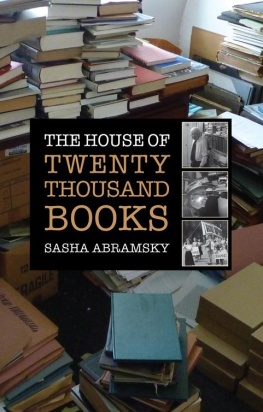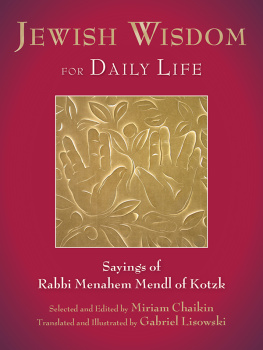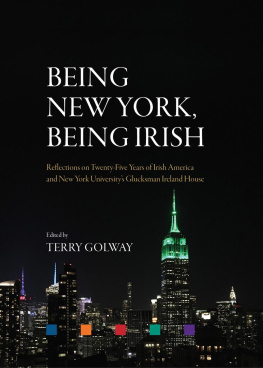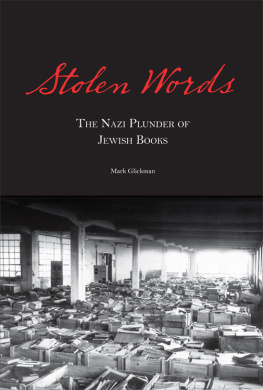The sheer richness of this marvellous book in terms of its style, think Borges, Perec amply complements the wondrous complexity of the family in terms of its subject-matter, think the Eitingons, the Ephrussi about which Sasha Abramsky writes so lovingly. And as a portrait of Londons left-wing Jewish intellectual life it is surely without equal.
I loved this touching and heartfelt celebration of a scholar, teacher and bibliophile, a man whose profound learning was finetempered by humane wisdom and self-knowledge. We might all of us envy Sasha Abramsky in possessing such a remarkable grandfather, heroic in his integrity and evoked for us here with real eloquence and affection.
Sasha Abramsky has combined four kinds of history familial, political, Jewish, and literary into one brilliant and compelling book. With him as an erudite and sensitive guide, any reader will be grateful for the opportunity to be immersed into the house of twenty thousand books.
This book is dedicated to Chimen and Miriam Abramsky.
You were, quite simply, extraordinary.
I miss you and mourn for you every day.
Prologue I:
Saying Goodbye
He looks upon himself as a part of the books, or the books a part of him, I dont know which.
William Morris, News From Nowhere (1890).
T HERE IS NO SOUND on earth like that of a quiet man, a dignified man, exploding in primal grief. Nothing compares to it not fingernails scraping on a blackboard, not the whirr of a dental drill through enamel. Nothing. It is the howl of absolute horror, a keening black hole of noise that sucks in everything else. It pulls you into the abyss extraordinary, out-of-character, it brooks no dissent. This, the sound announces, is about forever.
That is the noise I heard as I cradled the phone to my left ear in March 2010. I was at home, in Sacramento, California, perched desolate on a sofa in the TV room, my wife and children in another room. Six thousand miles away, my father was sitting next to his fathers body at his north London home at 5 Hillway, in Highgate. A few minutes earlier, my grandfather, Chimen Abramsky, had finally died. Of what? Old age? He was ninety-three years old. Complications from Parkinsons disease? He had been deterioratingfor years, a frail, deaf old man, a widower increasingly locked, stony-faced , into a broken, frozen body. Or the aftermath of a horrifying series of late-life illnesses and infections, each of which in and of itself ought to have killed him? In the end, the cause didnt really matter. What mattered was that the last of my grandparents had died, a man who had been my teacher, mentor and guru, as well as my Nye the name I coined for him when I was a toddler, because he always wore a tie and I couldnt pronounce that word. My wonderful, at times playful, granddad the old man who would dance around his dining room with a great stack of colourful plastic cups, each one fitting neatly into the next, balanced atop his head to entertain me when I was a young child was gone. The man who had surrounded himself with tens of thousands of wondrously rare books, bought over the better part of a century, had disappeared, everything that made him him replaced with the waxen, impersonal stillness of death.
As I started to weep, the sobs shaking me as if I were a rag doll, part of me floated up above the scene and, looking down, wondered why I was so shocked. After all, I had had plenty of time to practise my grief: Chimens decline had been slow, his final months painful and humiliating, every phone call to my parents or siblings begun with an update on his tenuous hold on life. He had become, during those last few years, a coda to his own story.
***
In the seventeenth century, the French philosopher Ren Descartes had famously concluded I think, therefore I am. For much of Chimens life, as he methodically constructed his House of Books, the reverse had held: he was, and therefore he thought had he not thought, read, analysed the world around him, and the history from whence that world grew, he would have been a lost soul. He was, after all, never very good at twiddling his thumbs. But now, in his nineties, with his body wrecked by Parkinsons, with his hearing gone, unable to leave his house to go on the walks that he used to love, he became a prisoner; his mind locked in his failing body, that body cloistered away in his House of Books. Bit by bit, the world closed in on him; eventually, he could no longer make it up the stairs. His world was reduced to the small, book-filled rooms of his homes ground floor. The house that had once served as one of left-wing Londons great salons, which still contained one of Englands most important private libraries, now became utterly claustrophobic. The home that had sparkled with intellectual life when I visited it as a child became a little frightening, decrepit, a place I took my own children to out of obligation rather than joy. Animated conversation was replaced by the long silences of deaf old age; the bustle of a crowded kitchen and a gaggle of diners and overnight guests gave away to the stillness of Parkinsons.
Now, the Cartesian equation righted itself: seeking to maintain a hold on life, on sanity, Chimen became even more obsessed with the world of books that he had created for himself. Like a man who pinches himself to make sure he still has feeling, Chimen read to reassure himself that he was still alive. He thought, therefore he was. For years, as he declined, his ability to think sustained him; he clung to his extraordinary intellectual facilities, to his near-photographic powers of recall: when a social worker, attempting to ascertain his mental acuity, asked him if he knew who the Prime Minister was, Chimen responded witheringly that he could list every Prime Minister from the past two hundred years. But, at the very end, even his memory abandoned him. Physically broken, he finally became confused.
I had been grieving over Chimens dissolution for months, years even, the partial grief for the living that drips out at unexpected times and in unwanted places. But, as I listened now to my father keening in the book-filled living room in my grandfathers house near Hampstead Heath, the room my grandfather had eventually had to sleep in after he could no longer climb the stairs to his bedroom, something snapped. The ghastly permanence, the irrevocability, of the iron door that separated death from life, sliced me up, left me in pieces.
***
A day later, I was in London, helping the family to prepare for my grandfathers funeral. We roamed around Chimens house, starting the grim process of sorting out a lifetimes accumulation of papers, completing financial documents, and all the other standard activity that accompanies death, filling up the hours in the days leading to the funeral. Solace came from Chimens library, an extraordinary collection made up of somewhere between fifteen and twenty thousand volumes. Even leaving aside the quality, the rarity of these books, many of them hundreds of years old, their sheer physical presence was overwhelming: if each book weighed, on average, a pound a fair estimate, given that many were slim little volumes just a few ounces in weight, while others were huge tomes easily weighing ten pounds then at a conservative guess the house contained upwards of ten tons of books, the weight of at least five large cars. There were, in addition, several tons of manuscripts, letters, and newspapers stacked around the house. I would stop in front of one bookshelf or another, take out an old book, smell it, feel it, look for its publication date, reacquaint myself with it as an old friend; I would talk about it with my younger brother, Kolya, who of all of the five grandchildren knew the most about Chimens collection.







